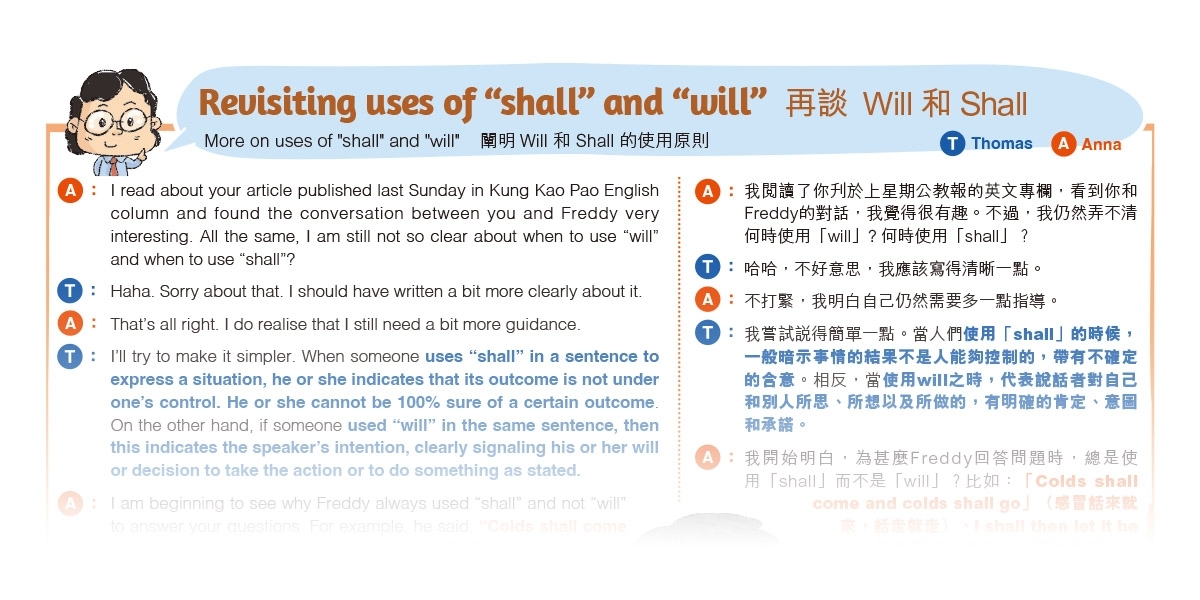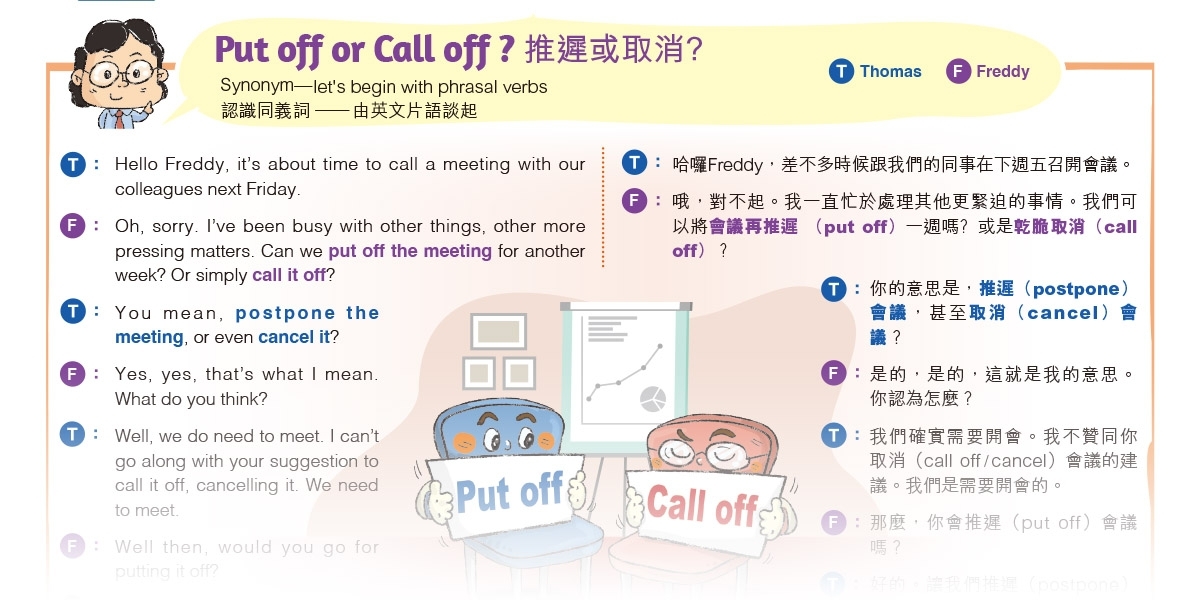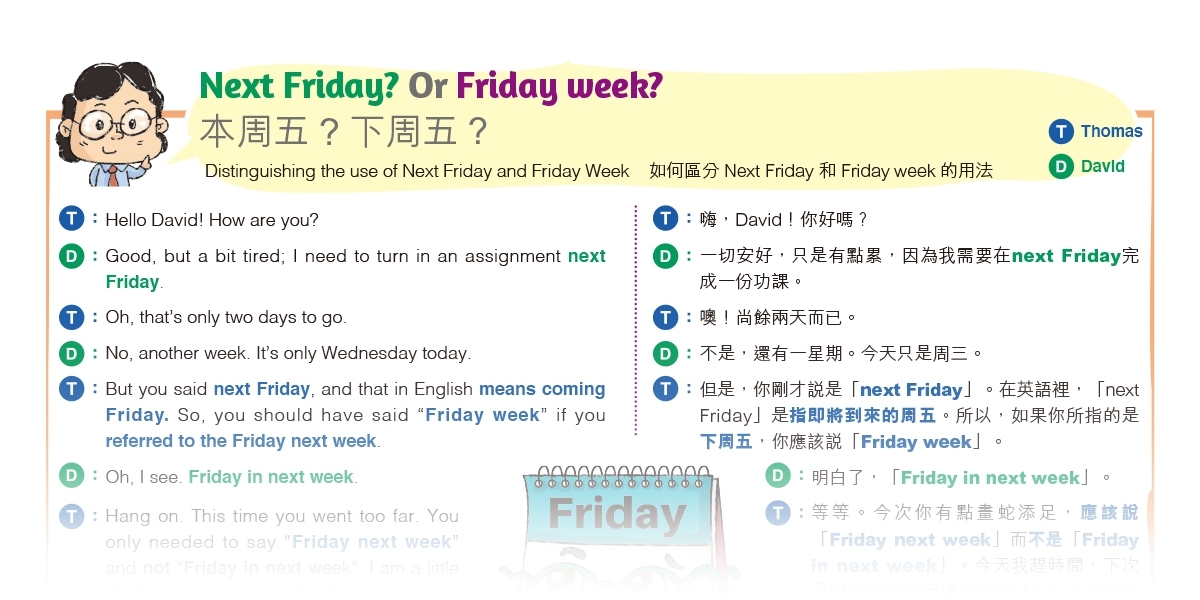昔日文章


Learning English with Thomas
2023.04.23
Revisiting uses of “shall” and “will”
再談 Will 和 Shall
More on uses of "shall" and "will" 闡明Will 和 Shall 的使用原則
T: Thomas, A: Anna
A: I read about your article published last Sunday in Kung Kao Pao English column and found the conversation between you and Freddy very interesting. All the same, I am still not so clear about when to use “will” and when to use “shall”?
T: Haha. Sorry about that. I should have written a bit more clearly about it.
A: That’s all right. I do realise that I still need a bit more guidance.
T: I’ll try to make it simpler. When someone uses “shall” in a sentence to express a situation, he or she indicates that its outcome is not under one’s control. He or she cannot be 100% sure of a certain outcome. On the other hand, if someone used “will” in the same sentence, then this indicates the speaker’s intention, clearly signaling his or her will or decision to take the action or to do something as stated.
A: I am beginning to see why Freddy always used “shall” and not “will” to answer your questions. For example, he said, “Colds shall come and colds shall go”; and “I shall let it be”. That’s because he wasn’t sure himself when he would fall sick, and when he would get well again.
T: As a matter of fact, there are some more principles regarding such uses. But I am short on time today. Why don’t you come to my office next week and we’ll chat again.
A: Ah right. See you next week.
A: 我閱讀了你刋於上星期公教報的英文專欄,看到你和Freddy的對話,我覺得很有趣。不過,我仍然弄不清何時使用「will」? 何時使用「shall」?
T: 哈哈,不好意思,我應該寫得清晰一點。
A: 不打緊,我明白自己仍然需要多一點指導。
T: 我嘗試說得簡單一點。當人們使用「shall」的時候, 一般暗示事情的結果不是人能夠控制的,帶有不確定的含意。相反,當使用will之時,代表說話者對自己和別人所思、所想以及所做的,有明確的肯定、意圖和承諾。
A: 我開始明白,為甚麼Freddy回答問題時,總是使用「shall」而不是「will」?比如:「Colds shall come and colds shall go」(感冒話來就來,話走就走)、I shall then let it be (我會順其自然吧)。因為當時他也不確定自己何時生病,何時康復。
T: 其實,何時使用Will和Shall,還有其他的原則。今天我趕時間,不如下星期到我辦公室,我們再談一談。
A: 好啊!下星期見。


Learning English with Thomas
2023.03.05
Put off or Call off ?
推遲或取消﹖
Synonym— let's begin with phrasal verbs
認識同義詞 —— 由英文片語談起
T:Thomas,F:Freddy
T: Hello Freddy, it’s about time to call a meeting with our colleagues next Friday.
F: Oh, sorry. I’ve been busy with other things, other more pressing matters. Can we put off the meeting for another week? Or simply call it off?
T: You mean, postpone the meeting, or even cancel it?
F: Yes, yes, that’s what I mean. What do you think?
T: Well, we do need to meet. I can’t go along with your suggestion to call it off, cancelling it. We need to meet.
F: Well then, would you go for putting it off?
T: OK. Let’s postpone it for a week. That is, we’ll meet Friday week.
T: 哈囉Freddy,差不多時候跟我們的同事在下週五召開會議。
F: 哦,對不起。我一直忙於處理其他更緊迫的事情。我們可以將會議再推遲 (put off)一週嗎﹖或是乾脆取消(call off)?
T: 你的意思是,推遲(postpone) 會議,甚至取消(cancel)會議?
F: 是的,是的,這就是我的意思。你認為怎麼?
T: 我們確實需要開會。我不贊同你取消(call off / cancel)會議的建議。我們是需要開會的。
F: 那麼,你會推遲(put off)會議嗎?
T: 好的。讓我們推遲(postpone) 一週吧。也就是說,我們在週五見面。


Learning English with Thomas
2023.02.05
What’s up with “up” 不是亂「up」
Know English Phrasal Verbs, beginning with “up”
認識英文片語 ——由「up」字談起
T : ThomasC C : Clement
T: Good morning Clement! How are you?
C: Oh, sorry Thomas Sir. I didn’t see you. I was thinking about something.
T: What seems to be the problem, young man?
C: It’s just some comments from a teacher regarding my essay. I don’t quite understand what these two phrasal verbs mean.
Let me show you… (Both glancing at margin comments) …
T: Ah right. You are advised to “beef up your arguments” and “brush up your grammar”.
OK, the first one means that you’ll need to strengthen the way you present your argumentation,
and the second one advises you to do more revision in English grammar; there is still a lot you’ll need to improve.
C: I see. There are quite a lot of such combinations of verbs with prepositions, right?
T: There certainly are, and we can think of : “break up” (a relationship); “bring up” (a topic for discussion); “look up” (the dictionary); and so on.
C: Thanks so much, Thomas Sir. I’ve got to go now. Tell me more next time.
T: 早晨,Clement!你好嗎?
C: 噢,不好意思,Thomas老師。剛才看不到你。我剛才想著一些事。
T: 年輕人,你看似有些煩惱。
C: 昨天英文老師派回作文,寫下一些評語。當中有兩個英文片語,我不太明白。我想給你看看……(兩人都望向旁邊的評語)。
T: 好的。老師建議你「beef up your arguments」和「brush up your grammar」。前者意味著你需要強化你的論點,
後者建議你在文法方面需要多加複習,仍有不少地方需要改進。
C: 原來如此。看來有很多這樣的動詞與介詞的組合,對吧?
T: 肯定有,我們會想起:「break up」(a relationship)(分手);「bring up」(a topic for discussion)(提出一個課題作討論);
「look up」(the dictionary)(查字典) 等等。
C: 十分感謝你,Thomas老師。我現在要走了。下次再多加指點。


Learning English with Thomas
2022.11.13
Next Friday? Or Friday week?
本周五? 下周五?
Distinguishing the use of Next Friday and Friday Week 如何區分Next Friday 和 Friday week 的用法
T : Thomas D: David
T : Hello David! How are you?
D : Good, but a bit tired; I need to turn in an assignment next Friday.
T : Oh, that’s only two days to go.
D : No, another week. It’s only Wednesday today.
T : But you said next Friday, and that in English means coming Friday. So, you should have said “Friday week” if you referred to the Friday next week.
D : Oh, I see. Friday in next week.
T : Hang on. This time you went too far. You only needed to say “Friday next week” and not “Friday in next week”. I am a little short on time today, so I’ll talk with you more about how to use the preposition “in” to denote points of time and dates.
D : Righto, OK, and thanks again.
T : 嗨,David!你好嗎?
D : 一切安好,只是有點累,因為我需要在next Friday完成一份功課。
T : 噢!尚餘兩天而已。
D : 不是,還有一星期。今天只是周三。
T : 但是,你剛才說是「next Friday」。在英語裡,「next Friday」是指即將到來的周五。所以,如果你所指的是下周五,你應該說「Friday week」。
D : 明白了,「Friday in next week」。
T : 等等。今次你有點畫蛇添足, 應該說「Friday next week」而不是「Friday in next week」。今天我趕時間,下次再跟你談談如何運用介詞「in」去指示時間和日期。
D : 好的,再次感謝你。


